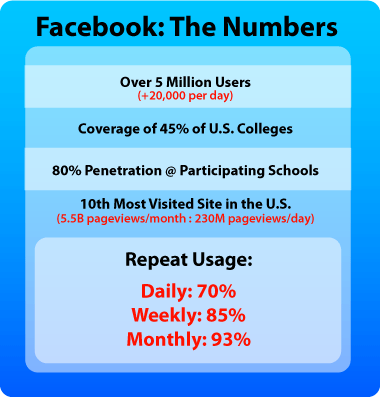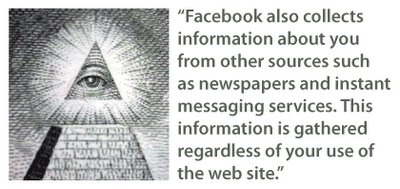Mirrored from jacobmorse.com.
If you are an active Internet user and under the age of 25 (or 30), you probably fit in one of two categories; either [1] You have tried social networking, but didn't really get what the buzz was about, or [2] you get it, you dig it, and you sit for hours scouring, posting comments and photos, and clicking refresh obsessively.
Everyone has heard of Facebook. At almost 2 years old, it's growth is staggering.

Take a look at the Repeat Usage statistics, in particular and tell me that this isn't a craze bordering on obsession. 70 percent of users return on a daily basis to a site that really isn't all that dynamic. There are no blogs; just personal info, a place to post blurbs on users' "wall", and now pictures. With websites like Facebook and MySpace gaining an almost-disturbing amount of popularity, it seems that our desire for networking has trumped our sound-thinking, skepticism and desire for privacy.
I started thinking about this issue recently, and the question just keeps popping up: Why do we place so much trust in the creators of these websites? Since the emergence of "Web 2.0", it seems that with a simple "We're not evil, try our Beta" everyone is falling over themselves to shell out as much information as it takes.
Stop and think about Facebook for one minute. A 21-year-old Harvard student starts a networking site for college students, and now there are over 5 million users, many of which have probably never looked at the Privacy Policy. After all, Facebook is fun, so they freely post their name, address, school, concentration, political affiliation, friends, plans and even photos in which faces are linked to profiles. Comforted by the idea that this info isn't crawled by search engines, the fact remains that membership is only limited by the ownership of an ".edu" e-mail address (the Wall Street Journal expressed concerns about this, in fact).
What about the Privacy Policy? In the Help Section of Facebook it says, "Facebook respects your privacy. We don't distribute your user information to third parties" followed by "Read more about our Privacy Policy." Click the link and it says oh yeah, one more thing: we just might share your info, and it "may include sharing information with other companies, lawyers, agents or government agencies." This is a pretty typical policy, actually. It's in the section entitled "The Information We Collect" that it gets a little disconcerting.
When you visit the Web Site you may provide us with two types of information: personal information you knowingly choose to disclose that is collected by us and Web Site use information collected by us on an aggregate basis as you and others browse our Web Site.
It goes on to explain cookies, etc., but then ends with this vague third mode of data collection:

I'm not sure what that means, but I do remember something about AOL's updated terms of service.
I'm not usually big on conspiracy theories, but I point out Facebook's privacy policy to highlight some other interesting aspects of this company. It has been just a few months since Accel Partners announced a $13 million investment in Facebook. That may seem like no surprise that a VC is interested; Facebook's numbers are impressive. However, there are some significant details that cannot be overlooked.
1. Other VCs weren't very interested.
The concept isn't a new one, and according to Private Equity Week:
It is also an enormous gamble for the firm, which typically invests in networking and software and is betting its status on Thefacebook. Not only has Accel shied away from Internet-related investments in recent years, but also it is veering into territory that has not been too kind to VCs.
Several top-tier funds have bets on various social networking sites that had enjoyed flashy launches, but have been quiet since the startups were announced.
[...]
“They're operating on a wing and a prayer,” says one VC who met with Thefacebook, but didn't invest. “They don't have any valuable [intellectual property]. Those kids got lucky, but I don't know that [their business] will prove any better an investment than the other social networking sites we've seen.”
The fact of the matter is, regardless of Facebook's success, a $13 million investment is huge at this stage of the social networking game. That leads one to wonder about Accel's motivation.
2. The VCs that ARE Interested have strange connections
Take, for example, Jim Breyer, manager of Accel's Investment Team, and the guy working most closely with Facebook. Breyer is the former chair of the National Venture Capital Association (NVAC), where he served with Gilman Louie, CEO of In-Q-Tel. In-Q-Tel is a venture capital firm established by the Central Intelligence Agency in 1999. This firm works in various aspects of information technology and intelligence, particularly in "tools for the rapid deployment of distributed, economical data collection networks. Systems that are self-organizing or that provide tools for the aggregation and management of data from large numbers..." and other items "of interest to the CIA."
Breyer has also served on the board of BBN Technologies, a research and development firm also closely tied to In-Q-Tel. In fact BBN shared board members with In-Q-Tel, such as Anita Jones, former Director of Defense Research and Engineering for the U.S. Department of Defense. Her responsibilities included serving as an advisor to the Secretary of Defense and overseeing the Defense Advanced Research Projects Agency (DARPA).
In a 2002 NY Times article entitled, "Many Tools of Big Brother Are Already Up and Running", John Markoff shed light on DARPA as well as it's cousin, the Information Awareness Office, whose purpose was described as
[gathering] as much information as possible about everyone, in a centralized location, for easy perusal by the United States government, including (though not limited to) Internet activity, credit card purchase histories, airline ticket purchases, car rentals, medical records, educational transcripts, driver's licenses, utility bills, tax returns, and any other available data.
That almost sounds like a description of social networking itself. It's interesting to note that the IOA's original mission statement, "Total Information Awareness (TIA)" was adapted in 2003 to "Terrorist Information Awareness (TIA)." That was convenient. Following a Congressional investigation, the IAO "disappeared", though it's difficult to say if it ceased to exist. The Department of Defense and the CIA have their legal limitations; what better way to usurp those than to seek commercial products that do the job for them?
Proponent articles for Total Information awareness appeared in National Review and The Weekly Standard. It is interesting to note that Peter Thiel, who is also a significant investor to Facebook sits on the board of the VanguardPAC, and likely holds similar views.
I'll say this one more time; I'm not a crackpot, and I don't go around sniffing for conspiracies. There are simply so many strange connections back to the CIA and intelligence-hungry organizations that it truly has me concerned. Worst case scenario: we could be voluntarily handing over personal information to the government in a clean, searchable format. If there is something to these connections, we have - on our own accord - created an extensive network that Orwell's Big Brother could have only dreamed of.
Update: Over at The Sounds of Crickets Chirping there are some interesting points made on this topic...
Another Update: Trent Lapinski (AppleXnet.com) details some interesting information about MySpace.
About me
- My name is Jacob.
- Want to know more?
Links
- Me, Elsewhere:
- Me: Del.icio.us
- Me: Last.fm
- Me: Via Crucis
- Flickr (Moblog)
- Friends:
- Anderson Imes
- Wancalo




